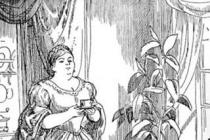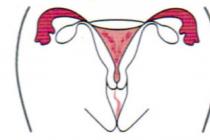The difference between Olga Ilyinskaya and Agafya Matveevna Pshenitsyna is masterfully depicted by Goncharov, starting with a portrait description: “She was about thirty years old. She was very white and full in her face, so that the blush, it seems, could not break through her cheeks ... Her eyes were grayish-ingenuous, like the whole expression of her face; hands are white, but hard ... ". The author did not give such a detailed description of Olga's appearance, as if wanting to emphasize that the main thing in her was not external qualities.
In the guise of Agafya Matveevna, the author (and hence his hero) notes “strong healthy breasts”, full white arms with round elbows, a magnificent figure covered in a dress. “She has a simple but pleasant face,” Oblomov condescendingly decided, “she must be a kind woman!” And indeed, Agafya Matveevna was a kind, cordial, decent woman, she cared so much for Ilya Ilyich that she was ready to sacrifice a lot for him. For example, she took her jewelry to the pawnshop so that the master would not need anything. To Stolz's question about the promissory note (a fraudulent forgery of her brother and Tarantiev, about which Agafya did not know), she simply answered that the master did not owe her anything, although she had been feeding him at her own expense for a long time.
However, the author does not put forward the spiritual qualities of this heroine in the first place, and the narration is dominated by everyday and physiological details that are important for the main character. These are seductive shoulders, full arms with round elbows, which Oblomov admired "with the same pleasure with which he looked at a hot cheesecake in the morning." This woman brought peace and tranquility to his soul, and he felt grateful to her for the amazing atmosphere of comfort, so reminiscent of the familiar and sweet Oblomov life.
Agafya Matveevna was a hardworking housewife, and she was ready to serve the person she loved with all her heart every minute. It is impossible to imagine her resting, and Oblomov liked her tirelessness. It also suited him very well that they did not demand anything from him, did not bother him with anything, but they tirelessly take care of him. Love and sacrifice are always there in the lives of ordinary Russian women, and Agafya Pshenitsyna is one of them. She is not a noblewoman or a peasant ("official"), and earns her living by renting out rooms to guests, doing many different jobs for the tenants and for her family. She has philistine views on the relationship of men and women, but when she realized that she fell in love with Oblomov, she was ready for any sacrifice for him, caring for him became the meaning of her life.
In many ways, her faithful assistant Anisya, the wife of Zakhar, is similar to Agafya Matveevna, with whom the hostess became very friends. They are both very hardworking, they treat work not as an exhausting, difficult duty, but as a habitual and necessary condition of life, which was the complete opposite of the views on work in Oblomovka. Anisya was "an agile woman, about forty-seven years old, with a caring smile ... and tenacious, never tired hands." The lazy and grouchy Zakhar, who sometimes spoke menacingly and angrily to his wife, had to admit that “Anisya is smarter than him!” And therefore, it was Anisya who decided all the misunderstandings with the master, who spoke to Oblomov in such a way, chattering non-stop, that he calmed down in perplexity.
The author notes the mutual sympathy of Agafya Matveevna and Anisya. “If there are sympathies of souls, if kindred hearts sense each other from afar...”, then such an example is the friendship of these women, which also testifies to the kindness and sincerity of Agafya Matveevna. And how could she not appreciate her assistant, if with her appearance everything in the house shone with cleanliness and order was put in place everywhere! So Anisya became a "great handyman" in the master's orders, and Agafya Matveevna found "a place in her heart" for Anisya, who also realized that from now on she, along with the hostess, would participate in the whole life of the house. “Two women understood each other and became inseparable”: they shared secrets in everything that was brought into the life of people by observant minds and centuries of experience.
Like all ordinary women, Anisya is not only inquisitive, but also curious, she is interested in the life of the master, but she will not engage in gossip and is ready to defend the honor of the owner at any moment if anyone dares to say too much.
When Ilya Ilyich married Agafya Matveevna, Anisya finally established her position in the Pshenitsyna house, and "the mutual attraction between Anisya and the hostess turned into an inseparable bond, into one existence." “Agafya Matveevna grew up, Anisya spread her arms like an eagle’s wings, and life boiled and flowed like a river.” If that's what the family needs, then Anisya won't even go to sleep, as long as everything is decent, as the master wants. And the kitchen became “a palladium of the activity of the great hostess and her worthy assistant”, under whose watchful eye the whole house was located, where her “agile, all-sweeping hand” disposed of.
The images of women, near whom Oblomov's calm life flows, were not introduced by the author by chance. The reader sees how love has a beneficial effect on the souls of those who are able to love selflessly, who are not afraid of work, and inspired women are ready for a lot. Their work seems to provoke them, and their eyes shine brighter. The images of Agafya Matveevna and Anisya help to see even more clearly the bright opposite against their background, master Ilya Ilyich, and the destructive effect that laziness and nobility brought up from childhood had on Oblomov. Even Olga's love did not inspire him to "feats", he suffered from the need to make efforts every day, when he had long been tired of just leaving the house. Oblomov did not want and could not work on himself, change himself and his usual way of life. And in the house of Pshenitsyna, many things reminded him of his childhood in Oblomovka, when you can admire the work of others, remaining at peace, while feeling care and love.
Agafya Matveevna idolizes the man who changed everything in her fate, considers him a special, noble and pampered nobleman who endowed her with his attention. Together with love, the soul of this simple woman blossomed, Agafya Matveevna grew spiritually, causing surprise with her transformation among those who knew her before. Now she is able to defend her right to a happy family life, and her brother and family are forced to move out, and Agafya Matveevna lives in peace and harmony with the person most dear to her. She accepted everything in him (Olga, however, could not do this even at the request of Ilya Ilyich: “accept me as I am”).
Agafya was not annoyed by Oblomov's inactivity, drowsiness, laziness, and she recognized his quiet, calm disposition and his way of life as an ideal. This woman believed that "God put a soul into her life" when Ilya Ilyich appeared in her house. Having married him, she began to realize herself in a new way, since "now she already knew why she lived." And even after Oblomov’s death, remaining eternally inconsolable, Agafya Matveevna understood that “beams spilled over her whole life, a quiet light from seven years that flew by like an instant.”
Agafya Matveevna loved her son Andryusha no less than his father, but she wisely judged that Stolz and Olga would do much more for his upbringing than she did. And at the end of the novel, the author reports on her rapprochement with Olga Ilyinskaya, but not only because of their common concern for Andryusha. It turns out that they were "connected by a common sympathy, one memory of the soul of the deceased, pure as crystal."
So, at first, infinitely distant and different women become closer, thanks to the ability to love strongly and selflessly, although fate and life led them in different ways.
Pshenitsyna Agafya Matveevna - characteristics of the character
Pshenitsyna Agafya Matveevna - the widow of an official, left with two children, sister of Ivan Matveevich Mukhoyarov, godfather Tarantiev. It was Tarantiev who settled Oblomov, who was forced to look for a new apartment, in P.'s house on the Vyborg side. “She was in her thirties. She was very white and full in the face, so that the blush could not seem to break through her cheeks. She had almost no eyebrows at all, and in their place were two slightly swollen, shiny stripes, with sparse blond hair. The eyes are greyish-ingenuous, as is the whole expression of the face; the arms are white, but hard, with large knots of blue veins protruding."
P. is taciturn and used to live without thinking about anything: “Her face took on a sensible and caring expression, even dullness disappeared when she started talking about a familiar subject. To every question that did not concern some positive goal known to her, she answered with a smile and silence. And her grin was nothing more than a form that covered up ignorance of the subject: not knowing what she should do, accustomed to the fact that her “brother” decides everything, only in skillful management of the house did P. reach perfection. Everything else for years and decades passed by the undeveloped mind.
Almost immediately after Oblomov moved to the Vyborg side, P. begins to arouse a certain interest in Ilya Ilyich, which can be regarded as purely erotic (the mistress's round white elbows constantly attracting Oblomov's attention). But the solution awaits at the end of the novel, when, shortly before his death, Ilya Ilyich has a dream where his mother, pointing to P., whispers: "Militris Kirbityevna." She names the name of his dream, inspired by Ilya Ilyich in early childhood by his nanny's fairy tales.
The image of P. never aroused particular interest among critics of the novel: a rough, primitive nature, which they used to look at only through the eyes of Stolz, as a terrible woman, symbolizing the depth of the fall of Ilya Ilyich. But it is no coincidence that Goncharov gives this simple woman a name close to the name of his beloved mother - Avdotya Matveevna Goncharova, a merchant widow who for many years lived in the same house with Goncharov's godfather, nobleman N. N. Tregubov, who raised her sons and gave them education.
P. is in constant motion, unlike Oblomov, realizing that “there is always work” and that it is the true content of life, and not at all a punishment, as they believed in Oblomovka. Her incessantly flashing elbows attract Oblomov's attention not only by beauty, but also by the activity of the heroine, which he is not fully aware of. Outwardly, P. is perceived as a kind of perpetuum mobile, without thought, without a glimpse of feeling, the “brother” calls her nothing more than a “cow” or “horse”, seeing in her sister only gratuitous labor power. “Even hit her, even hug her - everything is grinning like a horse on oats,” he says about her godfather Tarantiev, preparing, on the advice of the latter, to track down P.’s relationship with Oblomov and demand money “for dishonor” from Ilya Ilyich.
Gradually, as Oblomov realizes that he has nowhere else to strive, that it is here, in the house on the Vyborg side, that he has found the coveted way of life of his native Oblomovka, a serious internal change takes place in the fate of P. herself. In constant work on the arrangement and care of the house, in household chores, she finds the meaning of her existence. In P., something unknown to her before began to awaken: anxieties, glimpses of reflections. In other words, love, more and more deep, pure, sincere, unable to express itself in words, but manifested in what P. knows and knows well: in taking care of Oblomov’s table and clothes, in prayers for his health, in sitting at night at the bedside of the sick Ilya Ilyich. “All her household ... received a new, living meaning: the peace and comfort of Ilya Ilyich. Before she saw it as a duty, now it has become her pleasure. She began to live in her own full and varied way... It was as if she suddenly switched to another faith and began to profess it, not arguing what kind of faith it was, what dogmas it contained, but blindly obeying its laws.
Oblomov for P. is a person from another world: she had never seen such people before. Knowing that ladies and gentlemen lived somewhere, she perceived their life in much the same way as Oblomov listened to the fairy tale about Militrisa Kirbityevna in childhood. The meeting with Oblomov served as an impulse for rebirth, but the culprit of this process “did not understand how deeply this meaning took root and what an unexpected victory he made over the heart of the hostess ... And P.’s feeling, so normal, natural, disinterested, remained a mystery to Oblomov, for those around her and for herself.
Oblomov "became close to Agafya Matveevna - as if moving towards the fire, from which it becomes warmer and warmer, but which cannot be loved." P. is the only absolutely disinterested and decisive person surrounded by Oblomov. Without delving into any difficulties, she does what is necessary at the moment: she pawns her own pearls and silver, she is ready to borrow money from the relatives of her late husband, only so that Oblomov does not feel a lack of anything. When the intrigues of Mukhoyarov and Tarantiev reach their peak, P. resolutely renounces both his “brother” and his “godfather”.
Having devoted herself to taking care of Oblomov, P. lives as fully and diversely as she has never lived before, and her chosen one begins to feel as if in his native Oblomovka: “... he quietly and gradually fit into the simple and wide coffin of the rest of his existence, made with their own hands, like desert elders who turn their backs on life and dig their own graves.
P. and Oblomov have a son. Understanding the difference between this child and the children from her first husband, P., after the death of Ilya Ilyich, meekly gives him up to be raised by the Stolts. The death of Oblomov brings a new color to the existence of P. - she is the widow of a landowner, a gentleman, which is constantly reproached by her "brother" and his wife. And although P.’s lifestyle has not changed in anything (she still serves the Mukhoyarov family), the thought constantly pulsates in her that “her life has lost and shone, that God put her soul into her life and took it out again ... now she knew why she had lived and that she had not lived in vain ... Beams spilled over her whole life, a quiet light from seven years that had flown by like one instant, and she had nothing more to wish for, nowhere to go.
The unselfishness of P. is given to understand in the finale of the novel and Stolz: she does not need his reports in the management of the estate, just as the income from Oblomovka, put in order by Stolz, is not needed either. The light of life P. died out together with Ilya Ilyich.
The secondary character of Agafya Matveevna Pshenitsyna is one of the characteristic female images of the work and is the complete opposite of the main character of the novel, Olga Ilyinskaya.
The author portrays the heroine as a real Russian woman of magnificent forms, deeply religious. Agafya is described as a wonderful mistress of the house, who loves cleanliness and homeliness, a kind, modest, submissive wife of the protagonist Oblomov.
A woman is not at all educated and is not aware of many life issues, she has a very narrow outlook, but at the same time she knows how to skillfully hide it, preferring either to remain silent or smile sweetly. Agafya's interests are limited to housekeeping, working in the kitchen, communicating with servants or with merchants.
The writer focuses on the positive qualities of the heroine, who surrounded her husband with love and constant care, protecting him from any problems and worries. This is exactly that quiet calm harbor, the long-awaited peaceful happiness that Oblomov dreamed of all his life.
Agafya's love for Oblomov is significantly different from the feelings that Olga had for him. Pshenitsyna loves her husband not for something, but for the opportunity to be near him and feel his sincere gratitude for her self-sacrifice for him.
The protagonist, exhausted by his relationship with Olga Ilyinskaya, finds calm well-being with Agafya devoted to him, plunging into the routine of his illusory dreamy world. On the other hand, the image of Pshenitsyna illustrates and reveals the drama of Oblomov's life ideals, stuck in the abyss of inaction and laziness. It is the pacifying atmosphere of family life, created by Agafya for her beloved husband, that leads in the finale of the novel to the sudden death of Oblomov, who refuses to follow the recommendations of the doctors. The spouses have a son, whom Agafya adores, but decides to give Oblomov's friends the Stolts to be raised, because he believes that only they can give the child of an extraordinary person the necessary upbringing and education.
Narrating the life of Oblomov with Agafya, the writer involuntarily compares Pshenitsyna with Ilyinskaya and reveals the paradoxical truth that an ordinary believing woman, embraced by a comprehensive feeling of love, is superior in everything to a successful, educated, intelligent careerist, and can be completely happy in her disinterested love.
Option 2
Agafya Pshenitsyna is a minor character. She was created as the perfect opposite of the main character of the work. Despite the fact that she is a minor character, she is one of the main characters of the work.
Agafya is described as a typical Russian woman. She has curvaceous forms that do not interfere with her at all. She really believes in God and this greatly affects her character. Agafya is a real hostess, she loves to do housework and keep things clean. She is the perfect wife for the main character.
She has no education and she doesn't know much. All her interests are household chores. She really likes to do this, and she doesn’t even want to think about anything else.
Agafya is a very positive character. She loves her husband very much and takes care of him. She protects him from the problems of the outside world. Oblomov loves her very much. He always dreamed of such a wife, who would become heaven for him.
Agafya really loves Oblomov. And this love is very different from Olga's feelings. Agafya loves him for being him. Not for some of his merits and money. She loves him for his soul and good disposition. She sacrifices everything for his well-being.
Oblomov was very tired of past relationships, and the affair with Agafya became a real vacation for him. But perhaps because of this, Oblomov plunges into his own world, which is filled with idleness and laziness. He is so used to doing nothing, because he knows that his wife will do everything for him. Perhaps this is why he dies. Because of his laziness and frivolity, he rejects the advice of doctors. And it ends very badly. He dies due to an illness that could be cured if Oblomov himself did at least something for this. But his wife created such a comfortable atmosphere for him that he lost the habit of it. He has become unaccustomed to the fact that he needs to do something to achieve the goal. This shows that laziness is destructive.
One day, a child is born to the heroes. Agafya loves him very much, but still decides to give him up to be raised by Oblomov's friends. She believes that it is there that the child will be able to receive a decent upbringing and education.
The writer implicitly compares her and Olga. He shows what a simple Russian woman who has no education. Which is very religious and loves Oblomov very much, can surpass an educated careerist in everything. Agafya proves that selfless love is much more valuable and pleasant.
Composition Characteristics and image of Agafya Pshenitsyna
In the novel by Ivan Alexandrovich Goncharov "Oblomov" Agafya Matveevna Pshenitsyna is a minor female character. Agafya Matveevna is a simple Russian woman, she is uneducated and very often communicates with servants and food merchants. Pshenitsyna is very kind and gives herself entirely to her beloved people. Until she became Oblomov's wife, she devotes herself entirely to her brother, and it may even seem that Agafya Matveevna does not have her own opinion and lives someone else's life.
Goncharov decided to make a contrast between the heroines Olga and Agafya, if Olga values material goods more, then Pshenitsyna is more of a person of spiritual organization. If Agafya Matveevna did not know the answer to some question, she simply remained silent or smiled sweetly at her interlocutor.
The writer described Agafya Matveevna Wheat as an angel and savior for his men, brother and Oblomov. She is a very economic and wise woman who has always tried to protect her man and create comfort and coziness for him. She liked that Oblomov felt comfortable next to her, because that's what she tried to do.
Oblomov was a very lazy person who loved to eat, Agafya Matveevna prepared all sorts of goodies for Oblomov and tried to please him in this. Perhaps it was this sacrifice and devotion entirely to Oblomov that made Pshenitsyna truly happy.
Agafya Matveevna was happy next to such an unusual person as Oblomov, she devoted herself to him and it touched her. She protects him from any grief and adversity and takes on all the work that she can. Agafya Matveevna is a believing woman and this faith helped her to be happy.
Ivan Alexandrovich emphasized that, despite the lack of education of the heroine, she became happy, which cannot be said about other characters in the novel. We can definitely say that Agafya Matveevna Pshenitsyna is a positive character. Pshenitsyna sets an example of endless love for a person and everything that surrounds her. Unlike the rest of the characters in the novel, she did not pursue money and found her own happiness. Ivan Alexandrovich sets as an example an ordinary Russian woman who has an infinite soul and is ready to sacrifice herself for the sake of love.
Some interesting essays
- Why is it often said "be careful what you wish for"? Final essay
Each of us has our own desires. They can be absolutely anything. Someone wants love, something wealth, and someone wants friends. Desires, they are desires for that, to wish them, to want and wait
- Analysis of the work Prince Silver Tolstoy (novel)
- The conflict in Gorky's play At the bottom of the essay
Maxim Gorky is a great classic of Russian literature of the late 19th century and early 20th century. His works are complex and ambiguous, but touching on issues that are relevant at all times and having
- Examples and Arguments of Compassion from the Literature
Compassion is a very important feeling that a person can show to another. It is the ability to empathize and feel the pain of others.
- The image and characteristics of Matryona in the story Matryonin yard Solzhenitsyn essay
The main character is about sixty years old, she is friendly and glad to see everyone, she lives in the countryside, so she got used to work from childhood.
|
Olga Sergeevna Ilinskaya |
Agafya Matveevna Pshenitsyna |
|
|
Character traits |
irresistible, kind, not like everyone else, ambitious |
Kind, sociable, hard-working, easily made contact, sweet, well-mannered, neat and independent |
|
Appearance |
she was tall, she had a bright, clean face, a refined neck and gray-blue eyes, wide eyebrows and long hair, thin lips |
She had gray eyes and a beautiful face, curvaceous, fair skin |
|
was an orphan, lost her parents at a young age, lived with her aunt, and despite her difficult childhood, she was very well-educated |
She was married to Pshenitsyn, but he died and the woman was left a widow; was the mother of two children |
|
|
Behavior |
was distinguished by little talkativeness, did not scatter words, spoke to the point, not quick-tempered, calm, with a sincere laugh |
Active, constantly busy with something; was cunning, but it all benefited Oblomov |
|
How I met Oblomov |
Stolz brought them together in the Ilyinsky's house. A new acquaintance was fascinated by the unusual voice of a girl |
We met thanks to Terentyev, soon after that Oblomov comes to Agafya to rent housing, after that he gets to know the girl more |
|
How did you treat Oblomov |
she was touched by stories about Oblomov, as well as the pure and sincere heart of Ilya. Soon the girl fell in love with Ilya and wanted to see changes in him. But alas, she was disappointed in him, although later she realized that he was an unusual person. |
He is very kind to him, prays for him, whom he is sick, carefully monitors his health and tries to cure. So he falls in love with Oblomov, idolizes him and considers him unusual |
|
How Oblomov treated |
Olga was an ideal for him, thanks to her he understood what bright feelings are. Their relationship began in the spring, but by the fall it had already ended. |
With Agafya Oblomov is calmer, he feels comfort and care. After a while, he confesses his feelings to her and decides to kiss |
|
Life goal |
change Oblomov, and learn to understand others |
Knows how to do everything, likes to work, but a little stupid. She does not think about the future, but simply lets life flow. I wanted to make everything comfortable, and especially in life with Oblomov |
|
How fate developed |
With age, she became smarter and wiser, Stoltz became her husband, from whom she gave birth to children |
They lived with Oblomov for 7 years, after which Agafya lost her husband, and her son Andrei remains one consolation |
|
Favorite hobby |
loved to sing and go to the theatre, play music and read |
A good housewife, industrious, loved to cook and take care of the household; did needlework |
|
Similar Features |
simple girls, faithful, domestic, kind |
|
Composition by Olga Ilyinskaya and Agafya Pshenitsyna
Love is one of the key issues in the work of the great Simbirsk writer Goncharov "Oblomov". Ilya Ilyich Oblomov is the center of two love stories. There were two women in his life, completely different, unlike each other. They both made a huge contribution to his life, but each is different. Let's compare these two, without a doubt, great women in the life of the hero, their characters and contribution to the image and character of the protagonist.
Olga Ilyinskaya is a sophisticated lady with an incredibly fine mental organization. The meeting of Ilya Ilyich with her was a gift of fate for him. He was incredibly lucky on the day they met and met. His life would not have been as eventful without her, albeit such a short time.
Olga was a creative girl, she loved literature, theater, had a great musical talent. This is what brought life to the passive existence of the hero. Thanks to her irresistible desire to develop, Oblomov was still able to briefly get up from his sofa, take off his robe and begin to act. Olga began to take him to the opera, to the theater. It was thanks to her that the hero began to feel at least something. Something seemed to turn over in his soul with her appearance.
Olga's true desire was to change the hero, to revive him, to make him feel. She did not want to put up with his being, but sought to destroy his habits, forcing him to live, and not exist. This is what a decisive, courageous girl does, ready to do anything for the sake of love.
However, the hero was not ready for such a drastic change. He didn't want to put aside his favorite robe forever for some love affair that only bored him. He broke Olga's heart. However, they forever remained the brightest love of each other. After all, there was no more passionate love in his life.
The second and last woman in the life of Ilya Ilyich was Agafya Pshenitsyna. Her character was radically different from Olga's. She was not at all attracted to change Ilya. He made her the way he was. With a book open on the same page, with a bathrobe, on a soft sofa. It only contributed to his regression, his degradation as a person. Agafya served him in every possible way, brought food, cleaned.
Their life was absolutely synonymous with life in Oblomovka. This is the life Ilya longed for. It was much more comfortable for him to live with Agafya, with her measured character.
Such a life could not lead to anything good, but Agafya did not understand this. It was enough for her that they were just comfortable living with each other. Such a passive life, devoid of movements and emotions, led not only to the death of Oblomov as a person, but also as a person.
Thus, we can conclude that these two different women changed the life of the hero, they brought love into his life, only the stories turned out to be opposite. One story - filling with emotions, passionate, bright. And the other is slow, measured, calm. The hero made his choice and, subsequently, paid for it.
We cannot blame him for this choice, because every person comes from childhood, and it can be extremely difficult to change him, no matter how much the other person wants it.
Some interesting essays
- Characteristics and image of Bobchinsky in the comedy Inspector Gogol essay
P.I. Bobchinsky is a minor comedy hero. He is a rather wealthy landowner and, thanks to his desire to collect all kinds of gossip, he is one of the first to know the news about the arrival of the auditor
- Essay football match
Football is one of the most ancient variants of sports. This sport is quite simple and straightforward, but at the present time it is probably one of the most popular variants of sports.
- The people in the fairy tales of Saltykov-Shchedrin essay
Today it is difficult to imagine Russian classical literature without the work of the great writer Mikhail Evgrafovich Saltykov. He created his works under the pseudonym Nikolai Shchedrin.
The ability to forgive, to selflessly help others, to show pity, is called generosity. The desire to restore justice is called revenge. We are often asked which is better?
Reasoning with arguments. Love is a strong and wonderful feeling, but is it a way to find yourself? When a person is in love, he, inspired by this feeling, is ready to commit rash acts and go to any feats.
Agafya Matveevna Pshenitsyna, nee Mukhoyarova, is a character in Ivan Goncharov's novel Oblomov. The wife of the protagonist - Ilya Ilyich Oblomov - and the mother of his little son Andryusha.
The woman was the sister of the fraudulent official Ivan Mukhoyarov. Before her marriage to Oblomov, Agafya was the widow of another official, and therefore bore the name Pshenitsyn at the time of her meeting with Oblomov.
Characteristics of the heroine

Agafya Matveevna was hardworking and constantly tried to please her lover, and then her husband. She liked to repeat that "there is always work." She did not allow herself to relax: "But it used to be that everything was boiling in her hands! From morning to evening it flies like that!"
The heroine sought to create comfort in the house and protect her loved one from unnecessary efforts. And at first, an acquaintance, and then a husband, Ilya Ilyich, appreciated Pshenitsyna's diligence: "You are a glorious hostess!"
However, Agafya was not distinguished by erudition and high intelligence. She barely knew the letter: "She only found it difficult because it took a lot to write ... she signed crookedly, obliquely and large ..." This can be explained by the fact that the woman did not like to read. Let's remember her negative answer to the question: "Do you read anything?" In addition, she practically did not go to the theater and was not interested in culture.

(Ilya Oblomov meets his future wife Agafya Matveevna)
The simplicity and ingenuity of this woman is emphasized even by her surname from her first marriage - Pshenitsyna. The wife of Ilya Oblomov was trusting. She could sign a letter, completely "unaware of what it was and why she was signing it."
Despite this, the lady tried to engage in a peculiar business - she traded chickens. Apparently, enterprise still united her with her brother. Although Pshenitsyna, unlike him, worked honestly and got up early in the morning: "she goes to bed - and no gun will wake her up until six o'clock"
Like her second husband, Agafya Matveevna was a homebody and did not like moving. "Here they were born, they lived for a century, and one must die here ..." - she used to say about her estate. Approximately the same way Ilya Ilyich treated his native Oblomovka earlier. He hardly forced himself to leave even to meet his friend Andrei Stolz.
Moreover, the author noticed that Pshenitsyna really fell in love with Oblomov for the first time. Apparently, she did not experience such feelings for the late first husband and father of her two older children: "Not loving, she lived to be thirty years old, and then suddenly, as if it came over her."
The image of the heroine in the work

Agafya Matfeevna is a thirty-year-old impoverished aristocrat. I. A. Goncharov describes the heroine as follows: “She was very white and full in her face. She had almost no eyebrows ... Her eyes were grayish-innocent, like the whole facial expression; her hands were white, but hard, with large knots protruding outwards blue veins."
Hard, hard-working hands emphasize the character's love of work. Fullness means that the lady did not care about appearance. Before us appeared a simple Russian woman. It was this, caring and economic, not too smart, that she attracted Oblomov.

(Agafya Petrovna, Ilya Oblomov and son Andrei, named after Andrei Stolz according to the novel)
The image of Agafya Matveevna, it would seem, is absolutely positive. A caring wife, an affectionate mother, an excellent hostess and just a kind and hardworking woman. However, the writer nevertheless emphasizes: her love turned out to be disastrous for Ilya Oblomov. To avoid a second stroke (apoplexy), Pshenitsyna's husband had to move, get up from his favorite sofa. However, his wife did not allow him to make any effort. She cared about the absolute comfort of her beloved man. And that was the tragic mistake of a loving wife. The apoplexy was repeated, and Ilya Ilyich nevertheless died.
However, the author still gives hope that Pshenitsyna realized her mistake. After all, it was not without reason that she gave her son to be raised by Ilinskaya and Stolz. The mother wanted the child to see an example of other people and a different life. She wished that Andryusha, unlike his late father, learned to leave his comfort zone and go towards his dream.
After all, Oblomov lost his once beloved Olga Ilyinskaya precisely because of his own laziness. And Ilya Ilyich himself was aware of this. Perhaps that is why his little son Andrei was the namesake of his active friend Stolz ... Therefore, Pshenitsyna, having entrusted the child to the friends of her late husband, did the right thing. She knew that he would approve of her decision...














